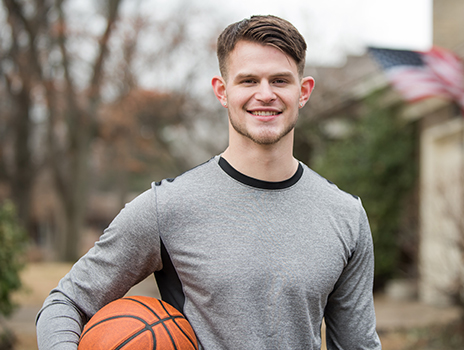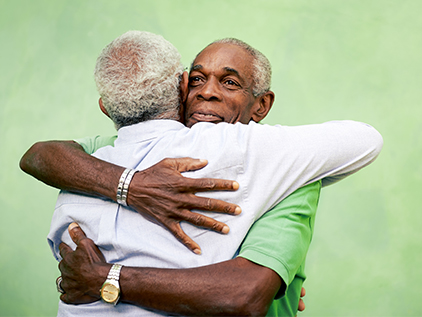Organ Transplant Provides Freedom, Opportunity


November 13, 2018
Brendan Conner often speaks fondly of "KJ," making statements like, "KJ's got this. He's doing great today." But the affectionate nickname doesn't reference a child or a pet, as one might assume. KJ is Brendan's kidney, a gift of life from his cousin, Kyle.
Brendan – a Platte City, Missouri, resident, basketball player, occasional tuxedo model and diehard Ohio Buckeyes fan – was diagnosed with Alport syndrome (glomerulonephritis) as a baby. The genetic condition involves progressive kidney disease.
"Let's just say my mom wasn't expecting the black color of the contents of my diaper," Brendan says. "We were off to the pediatrician right away."
Brendan began seeing a nephrologist, but enjoyed what he calls "a very normal childhood."
"Growing up, I was just like any other kid," he says. "I had to watch my diet a bit, monitoring my potassium and phosphorous intake, but I played sports. I lifted weights. I played football in college."
The signs of progressing kidney disease eventually emerged. In late high school, Brendan failed a hearing test – another characteristic of advancing Alport syndrome – and soon required hearing aids. His glomerular filtration rate (GFR) – a measure of kidney function at 60 or higher in a person with healthy kidneys – fell to 23.
"I had thought this was something I just had to deal with and accept," Brendan recalls. "Everyone has something difficult to get through in life. This was mine."
But Brendan's care team introduced a different strategy.
"Brendan's disease was less aggressive than many experience, allowing him to avoid dialysis for many years," says Brendan's former nephrologist Amna Ilahe, MD. "However, it is important for patients like Brendan to have an awareness of kidney transplant so they can begin the process early. Receiving a transplant before dialysis becomes necessary is the ideal progression and provides the best long-term result."
In June 2017, Brendan wondered how he might find a living kidney donor.
"We hoped to be able to keep it in the family," he says. "It's pretty hard to just walk up to someone and say, 'Hey, do you want to be my kidney donor?'" Brendan's older brother, Blaine, wasn't a match. His younger brother, Blake, unfortunately, also has Alport syndrome and would need a transplant himself someday.
In July, Brendan's GFR fell to 8, a dangerously low measure that indicates stage 5 kidney failure. Though he didn't feel particularly sick, his numbers were all too telling.
"That's when I turned to Facebook," Brendan says. "I decided it was time to share more details than I had before and explain my disease and treatment options. I never knew how many people responded to that post, calling in to be tested, but I know it was a lot. So many people stepped up to try to help."
One of those callers was Brendan's cousin, Kyle Baldwin, who works as an anesthesia technician at The University of Kansas Health System.
"From day one, I wanted to be tested," Kyle says. "I took some time to really think about it, to ask myself, if I am able, am I ready? I didn't want it to be the test results that made the decision. As it happened, it did come down to me, and I was ready and eager to step up."
Melissa Fowler, RN, living donor nurse coordinator for the health system, says such experiences are, happily, not unusual.
"Often in the world of living kidney donation, recipients are hesitant to tell people what they need and ask them for help," she says. "But people step forward every single day to learn more about living donation because they heard about someone's need."
On September 19, 2017, surgeons at The University of Kansas Health System removed a kidney from Kyle and transplanted it into Brendan.
"That's KJ," Brendan says. "My new kidney, Kyle Junior."
He has fun with the jokes, but his gratitude is 100% genuine.
"My doctors were amazing," he says. "I love them all. They even signed my kidney pillow, and I keep it on my bed to this day. And Kyle is absolutely awesome. I have so much respect for him. To give up his time and put his life on hold for me like that, I think the absolute world of him."
Kyle felt fortunate to be able to help and said it was a fairly straightforward decision. "There really was no profound aha moment for me," he says. "Brendan needed something that I could give. Why wouldn't I? My job in the OR gave me a little extra familiarity with surgical processes and made me feel a little more relaxed about it. I knew I could also support Brendan and our moms through the process with that experience. I have no regrets at all."
The kidney transplant care team was pleased to achieve positive outcomes for both donor and recipient.
"Both Kyle and Brendan were remarkable throughout this journey," Fowler says. "Kyle reached out to learn more about donation about the same time as Brendan used resources from the National Kidney Foundation's 'The Big Ask: The Big Give' initiative to create his Facebook post, which generated awareness and produced a number of calls. Kyle and Brendan were a true delight to work with."
"Living donation is always the preferred option," adds Dr. Ilahe. "The quality of the kidney is better and it will last longer. It is a planned, scheduled surgery, and patients experience better outcomes. Kyle and Brendan did great."
Kyle experienced a smooth recovery and is back to his favorite pastime, running.
Brendan is looking forward to returning to the activities he loves and, as a recent college graduate, is eager to begin a career in pharmaceutical sales.
"I feel so much freer now and will soon be able to do almost anything I want to do," he says. "I'm excited to play basketball again and to move forward in my career."

We offer a variety of appointment types. Learn more or call 913-588-1227 to schedule now.